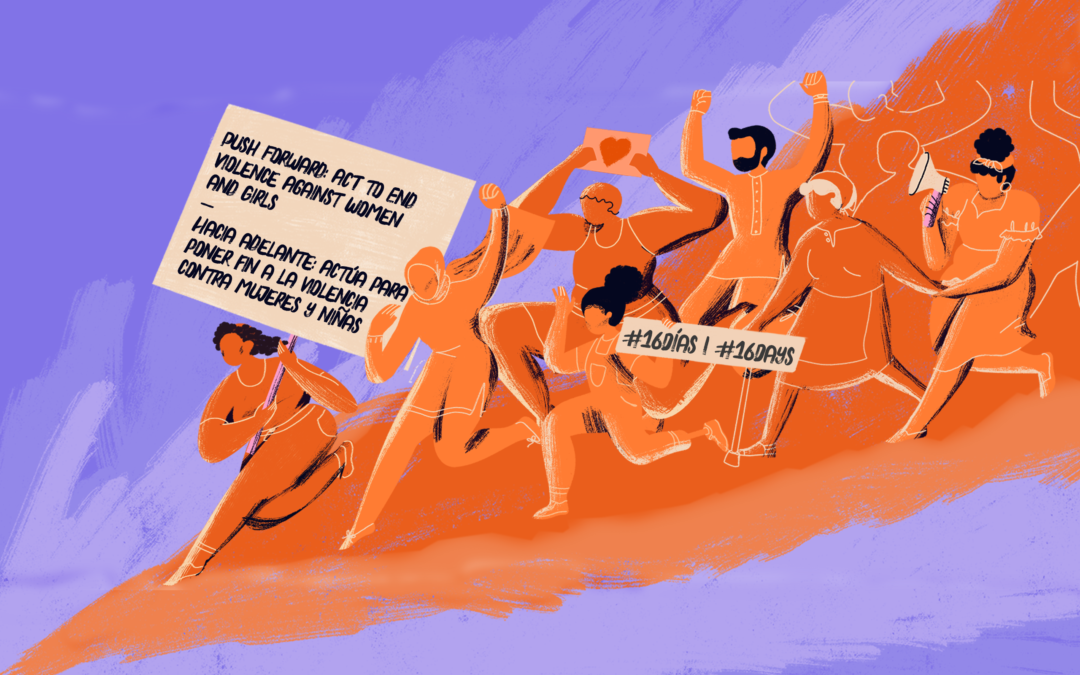For the 16 Days of Activism Against Gender-Based Violence UNLIREC joins the 2022 United Nations Campaign: “UNiTE! Activism to End Violence against Women & Girls”
Every year, from 25 November – International Day to End Violence against Women – to 10 December – International Human Rights Day – the United Nations Secretary-General leads the UNiTE! 16 Days of Activism to End Violence against Women and Girls Campaign.
This years’ campaign UNITE! Activism to End Violence against Women & Girls will aim to mobilize all society to become activists for the prevention of violence against women, to stand in solidarity with women’s rights activists and to support feminist movements around the world to resist the rollback on women’s rights and calling for a world free from VAWG.
Violence against women and girls (VAWG) is one of the most widespread, persistent and devastating human rights violations in the world. It encompasses any act of violence that results in, or is likely to result in, physical, sexual or psychological harm or suffering, as well as threats, coercion or arbitrary deprivation of liberty, whether in the public or private sphere.
UNLIREC reflects on the impact of firearms on gender-based violence against women and girls, as well as the importance of arms control as a building block to prevent and eliminate gender-based violence.
Why do we need to reflect on firearms and violence against women?
States are tasked to control and regulate firearms to prevent their use and misuse to commit homicide, making it a unique entry point for prevention.
What type of information is available on the use of firearms in femicides?
Although in the last decade States have made great strides to identify and define femicides to make it visible, also for statistical purposes, there are still few countries which collect disaggregated information on means used to carry out violence. Nor is data collected on the legal status of the weapons involved, the firearms license of the perpetrator, or whether the person has access to weapons as part of its profession in armed/security forces or private security companies.
Key questions to pose in cases of femicides committed with firearms
Was the firearm legal? Was the perpetrator a legal user? Did he have a valid license? Is he a member of the Armed Forces or the Police? Was he a armed private security guard? Were there reports of gender-based violence prior to the femicide? Was the existence of the firearm in possession of the perpetrator included in the reports? Were protection measures taken -such as firearms seizures or revocation of the firearms license?

What are the impacts of firearms on gender-based violence beyond femicides?
- Just the presence of a firearms at home in the hands of the perpetrator increases the risk of armed violence, resulting in a constant threat to the victim.
- Firearms can be used to threaten and intimidate even if they are not fired, leading to sexual, physical and psychological violence.
In addition to femicides, firearms can cause lifelong injuries, motor disabilities, physical and psychological trauma.
How can arms control be linked to measures to prevent gender-based violence against women and girls (GBV) ?
- Include protocols for registering the presence of firearms in the home in complaint handling and risk assessment procedures and whether these are used to violate the complainants.
- Incorporate relevant information into complaint records, such as number and types of firearms in the home; presence and quantities of ammunition and firearms components; permit to carry or possess firearms; if firearm is used for professional duty (e.g., police, military, private security guards).
- Share information with authorities responsible for:
- suspending or revoking firearms licenses;
- disabling applications for permits to carry and possess firearms;
- seizing or confiscating firearms and their ammunition.
- Include guidelines for actions against aggressors who possess firearms for professional duty, as those firearms belong to respective institutions or companies.
- Ensure efficient coordination between authorities providing services to victims and survivors of violence and standardize the procedures implemented by the staff of each institution to collect and record firearms related information.
- Consider denial of a firearm license because a history of gender-based violence as well as an official assessment profiling the person´s risk of violent behavior by a competent authority.
UNLIREC encourages States to strengthen arms control as a building block to prevent and eliminate gender-based violence against women and girls. This involves:
- Compilation of disaggregated and comprehensive data on firearms-related cases of violence against women.
- Linking normative frameworks on firearms control and regulation with those preventing and eliminating violence against women and girls.
- Training of public servants on the linkages and impacts of firearms on gender-based violence.
- Establishment of cooperation channels between State agencies with competencies in firearms control and care for victims of GBV.
For more information check our activities and publications on this topic here. These are just a few initiatives and reflections to promote the debate. You can also be part of the change! UNiTE the Campaign, follow us on our social networks and share your ideas.

